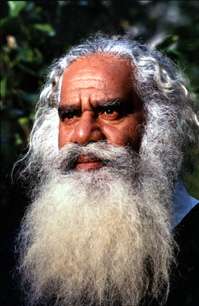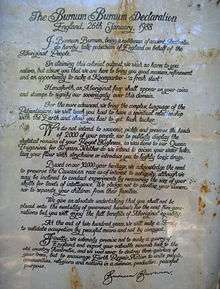Burnum Burnum
| Burnum Burnum | |
|---|---|
 | |
| Born |
10 January 1936 Wallaga Lake, New South Wales |
| Died |
18 August 1997 (aged 61) Woronora |
| Other names | Harry Penrith (rejected name from christening) |
| Occupation | Activist, actor, author |
Burnum Burnum (10 January 1936 – 18 August 1997) was an Australian Aboriginal activist, actor, and author. He was a Woiworrung and Yorta Yorta man at Wallaga Lake in southern New South Wales. He was originally named Harry Penrith[1] but took the name of his great grandfather, which means Great Warrior.
When he was a child, he was orphaned at an early age and spent many of his early years in children's homes run by the NSW Aborigines Welfare Board, most notably Kinchela Boys Home at Kempsey. The Welfare Board promoted his achievements in his rugby league and surf lifesaving at Kempsey in Dawn, and reported that he left Kinchela to become an Aboriginal pioneer in the NSW Public Service, working for the Department of Agriculture, where he remained for 13 years.[2] He also played first grade Rugby Union for Parramatta, and both rugby league and cricket.[3] While attending the University of Tasmania in the late 1960s, he led a successful movement to reclaim the remains of Truganini from the Tasmanian Museum for cremation. He was awarded a Churchill Fellowship in 1975 to study other Indigenous people.
He may be best remembered for planting the Aboriginal flag on the white cliffs of Dover on the Australian Bicentenary Day of 26 January 1988. This was his tongue-in-cheek way of claiming England, as Arthur Phillip had done to Burnum Burnum's homeland in 1788 when arriving with the First Fleet. A copy of the Burnum Burnum Declaration is on display among the indigenous carvings and sculptures at the Enchanted Maze (a.k.a. Arthur's Seat Maze), Mornington Peninsula, Melbourne, Australia.

In 1986, Burnum Burnum played roles in three films. The first was Dark Age, a thriller set in outback and tropical Australia, and which also starred David Gulpillil as Burnum's son. The second was Ground Zero, a thriller containing themes critical of the British and Australian governments' treatment of Indigenous Australians during nuclear weapon testing at Maralinga. The third was a satirical film, Marsupials: The Howling III, in which Burnum's character becomes a werewolf in the form of a Tasmanian tiger.[4]
Burnum appeared as Uncle Albert in the TV series Bony in 1992.
Burnum stood for election, in the upper house (the Legislative Council) of the NSW parliament during the Wran government era.
Former Prime Minister John Howard described Burnum Burnum as "a very gracious man and very strongly committed to the welfare of Aboriginal Australians".
Burnum Burnum lived in Woronora in his later life and was active in the local community. He died from heart disease on 18 August 1997. A portrait of Burnum Burnum now hangs in Sutherland Library. In 2005 Jannali Reserve was renamed Burnum Burnum Reserve in his honour.
References
- ↑ "Plan for Aboriginal mines". The Canberra Times. 55, (16,716). Australian Capital Territory, Australia. 3 July 1981. p. 3. Retrieved 11 August 2016 – via National Library of Australia.
- ↑ Farnsworth, Clyde (1997-08-20). "Burnum Burnum, 61, Fighter For Australia's Aborigines". New York Times. Retrieved 2009-04-18.
- ↑ Dawn, 1952 to circa 1963, see
- ↑ Norst, Marlene. 1999. Burnum Burnum: A Warrior for Peace. Roseville NSW: Simon & Schuster, 1999 / Kangaroo Press.